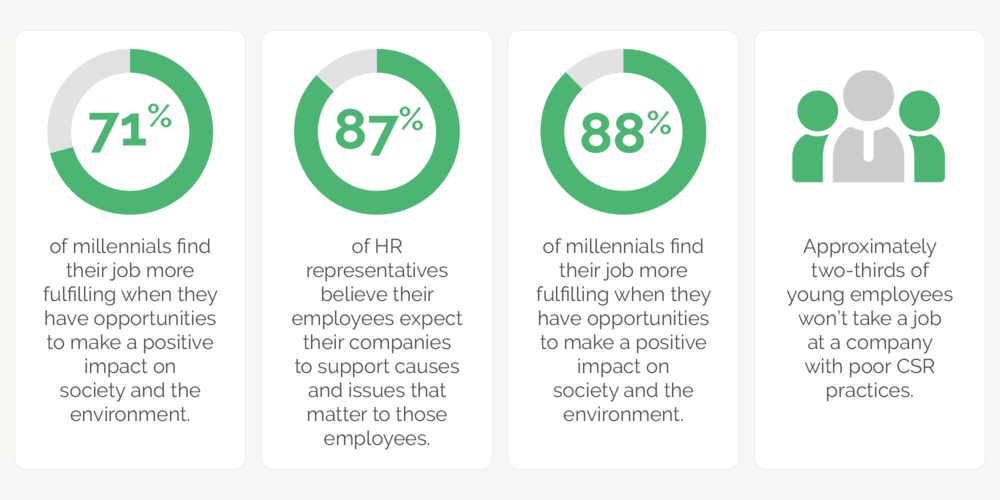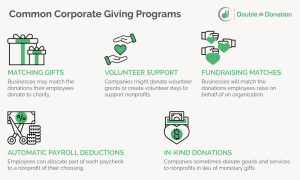Nonprofit Basics: Corporate Giving
Companies are becoming more aware of their duty to create a positive impact within their communities. By engaging in corporate giving, they support the charitable organizations that matter to their employees and customers. In turn, they can fulfill their obligations to do more good and create a better society.
This quick guide to corporate giving will outline the basics of these programs. Whether you work at a company that wants to start a matching gift program or a nonprofit that wants to raise more through corporate giving initiatives, you’ll learn everything you need to know to get started.
What Is Corporate Giving?
Corporate giving refers to the actions a company takes and the investments it makes to support nonprofits. Also known as “corporate philanthropy,” corporate giving includes all of the ways in which companies create positive social impact through generous financial donations, employee time, or their products and services. Common types of corporate giving programs include matching gifts, volunteerism, and in-kind donations.
Why Does Corporate Giving Exist?
Corporate giving provides nonprofits with the monetary and moral support they need to thrive. Whether they need financial support, in-kind services, or extra volunteers, companies can swoop in to fill the gaps.
Nonprofits aren’t the only ones who can benefit, though. Companies can position their organizations as desirable places to work by creating a culture where employees feel supported. Employees and customers alike are always on the lookout for philanthropic companies. Nonprofits Source’s online giving statistics page shows that:
- 71% of employees indicate that it’s very important to work at a company that partakes in philanthropy.
- 87% of human resource executives believe their employees expect their companies to support causes and issues that matter to those employees.
- 88% of millennials find their job more fulfilling when they have opportunities to make a positive impact on society and the environment.
- Approximately two-thirds of young employees won’t take a job at a company with poor corporate social responsibility (CSR) practices.

In other words, corporate giving contributes significantly to employees, companies, and the nonprofits they support.
Types of Corporate Giving Programs
The best part of corporate philanthropy is that it’s such an expansive space. There’s really no limit to how companies can support the causes in their communities.
Our guide to corporate giving dives into the different types of CSR programs, and we’ll give you a rundown of the most important ones you need to know.

Matching Gifts
As the most popular type of corporate giving, matching gifts have the power to multiply donations at no extra cost to donors. A business that offers this type of corporate giving will match the donations their employees make to charity, most often at a dollar-for-dollar rate.
So, if someone donates $100 to a nonprofit, their company might match that donation and send an additional $100, totaling $200.
Here’s how the process works:
- An individual donates to a nonprofit.
- The donor researches their eligibility for their employer’s program using a corporate giving database.
- If eligible, they visit their company’s giving portal or use the form the matching gift database provides them.
- After receiving the request, the employer confirms the initial donation with the nonprofit.
- If everything’s in order, the company will send a check to the nonprofit.
Auto-submission technology takes a few steps out of this process. Instead of having to navigate to an external portal and fill out a request form, donors can automatically submit their requests using 360MatchPro by Double the Donation. After donating, they’ll be prompted to answer a few additional questions to determine their eligibility for auto-submission. If eligible, our platform will submit the request to their employer for them!
While still somewhat new, auto-submission functionality is projected to yield an incredible 80% increase in matching gift revenue, according to our matching gift research. After all, who would pass up the opportunity to level up their gifts when it won’t cost them any more money or effort?
Volunteer Support
Corporate volunteering simplifies volunteer recruitment for nonprofits. It gives nonprofits the hands-on support they need while allowing employees to gain new skills like problem-solving and customer service outside of the workplace. Corporate volunteerism comes in a few different forms, such as:
- Dollars for Doers. Also called “volunteer grants,” Dollars for Doers programs require companies to donate to nonprofits where their employees regularly volunteer. When someone puts in a certain number of hours at a nonprofit, the company will typically donate a set amount. For instance, a company might donate $500 once someone spends 25 volunteer hours at a nonprofit within a year.
- Team volunteer grants. These are similar to Dollars for Doers programs. The difference is that these require multiple employees to volunteer at a nonprofit together. For example, Walmart offers this type of corporate giving program. When a group of five or more employees accumulates 25 hours at a nonprofit, Walmart will donate $500. The company offers different tiers, all the way up to 50 associates accumulating 250 hours for a grant of $5,000.
- Volunteer days. A company might choose a nearby nonprofit and set aside a day for employees to volunteer there together. These are great team-building opportunities!
There are a few other types of corporate giving through volunteering, but these are the most common examples. Some companies even provide volunteer paid time off (VTO), so employees can volunteer at their favorite organizations during the workday without giving up their paychecks.
Fundraising Matches
Similar to matching gifts, fundraising matches require companies to match donations to nonprofits. The difference is that these are the donations that employees raise on behalf of an organization.
So, if someone raises $2,000 for their favorite charity during a peer-to-peer fundraiser, their employer might match that amount and donate an additional $2,000. Like matching gifts, companies may offer fundraising matches at different ratios and have eligibility guidelines.
Automatic Payroll Deductions
Automatic payroll deductions use a similar process as contributing to a retirement account. Employees can opt into this corporate giving program to allocate part of each paycheck to their favorite charity.
Note that gifts are typically deducted post-tax, so donors should be able to write these donations off on their taxes. By marketing this type of corporate giving to donors, nonprofits can build a reliable pipeline of recurring donations.
In-Kind Donations
Corporate giving isn’t always about monetary donations. Companies might donate goods and services, which are also referred to as “in-kind donations.”
Jitasa’s guide to in-kind donations explains that when a nonprofit receives monetary gifts, it proceeds to invest that funding into its operations and programming. For instance, an organization might plan to spend $10,000 on event space and catering for an upcoming charity auction. When a company donates that space and catering in-kind, the nonprofit skips the extra step of paying for it themselves. Then, that frees up the $10,000 to be reallocated to other aspects of the organization’s mission.
In-kind donations can take several other forms, such as accounting services, graphic design services, and auction items. It all depends on what a nonprofit needs to keep its doors open.
Start Your Own Corporate Giving Program
Now that you know what corporate giving is and how it can impact your business, you can create your own program. Here are three tips to help you get started:
- Clearly define your goals and objectives. Before launching your workplace giving program, it’s essential to have a clear understanding of what you hope to achieve. Define specific goals, such as the amount of money you want to raise, the causes you want to support, or the level of employee participation you’re aiming for. Having well-defined objectives will help you stay focused and measure your program’s success.
- Engage employees and seek their input. Employee involvement is key to the success of any workplace giving program. Encourage employees to share their ideas and preferences for the causes or charities they care about. When employees feel a sense of ownership and connection to the program, they are more likely to participate.
- Provide recognition. Incentives like awards, personalized thank-you messages, and public acknowledgment can motivate employees to get involved in your workplace giving program.
As your corporate giving program expands, keep employees informed about the impact of their contributions, share success stories, and be open to suggestions for improvement. Regularly evaluate the program’s effectiveness and make adjustments as needed to ensure you continue to meet your goals.
Other Resources to Explore
Nonprofit Basics – Learn more nonprofit management essentials by exploring other expert resources.
Double the Donation’s Matching Gift Academy – Take a deep dive into corporate matching gifts with our new online learning experience.
Best Corporate Giving Software for Companies (& Trends We’re Seeing) – On the lookout for corporate giving tools to streamline your company’s philanthropic giving? Look no further! This guide walks through some of the best options on the market.
Corporate Sponsorships: The Ultimate Nonprofit Guide – Lining up sponsorships is a great way to build a reliable revenue stream for your nonprofit. Check out our complete guide to this type of corporate giving.


